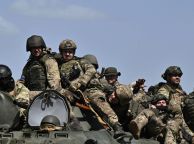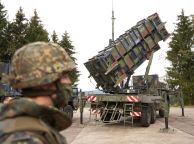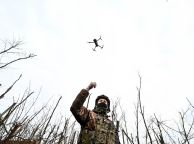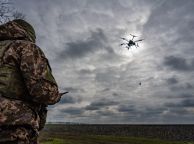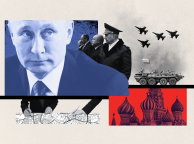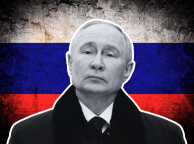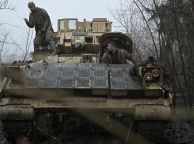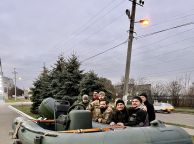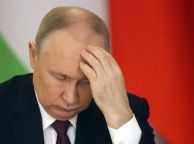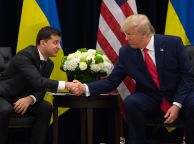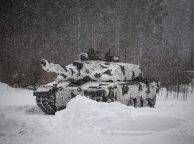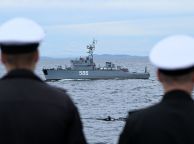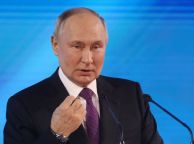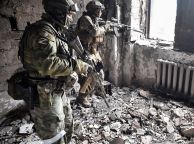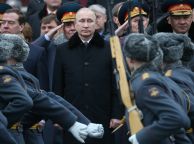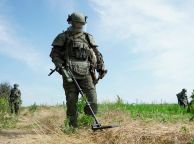By Ellie Cook
Injured and exposed in Russian-controlled Kherson, Ukrainian fighters who battle their way across the Dnieper River can do little else but sit tight for days, biding their time to be pulled from the keen gaze of Russian airborne drones.
"We must only wait," said a Ukrainian medical evacuation commander working with one of the country's marine brigades, whom Newsweek is identifying as Balibay.
Ukraine has spent months plugging away at Russia's grip on the east, or left, bank of the mighty Dnieper, the river that cleaves through the Ukrainian landscape roughly marking the frontlines of fighting in the south for more than a year.
Kyiv's forces have whittled away, establishing bridgeheads and pockets of control along the Russian-held bank in the southern Kherson region. But with few resources, Ukrainian soldiers are vulnerable to Russia's air strikes as they make their way across one of Europe's widest rivers, also known as the Dnipro.
But for those Ukrainian fighters who brave the east bank and are injured, waiting for evacuation can be one of the most dangerous parts of operations. Soldiers with non-life-threatening injuries can wait up to a week for medical evacuation from the east bank, often opting to get up and fight again instead, Balibay said.
If they can't do this, they dodge the constant eyes of Russian airborne drones and sit tight. Balibay declined to say whether Ukrainian soldiers waiting for evacuation have died on the east bank.
But the point remains, Ukraine is desperate for boats to keep up the momentum on the east bank, and to save the lives of the fighters braving the river crossing.
A U.K.-based charity thinks it has found the solution. The volunteer-led Mission Ukraine is petitioning the U.K. government to hand over confiscated vessels used by migrants making their way to U.K. shores, boats that the charity says are languishing unused in storage facilities at considerable cost to the U.K. public purse.
Back in 2021, London's The Times reported that the U.K. taxpayer had forked out around £500,000, or approximately $632,000, in just a year to store migrant boats.
"We are willing to sponsor the transportation cost," Mission Ukraine co-founder, Alex Kruglyak, told Newsweek. "We want to save U.K. taxpayer money by not having to store and recycle these boats, we are literally trying to make this a win-win for everyone."
Kruglyak added that most of the campaign up until now was funded by one generous sponsor, who preferred to remain anonymous.
When approached for comment by Newsweek, the U.K.'s Home Office said it was "fully committed to supporting Ukraine in their fight against Putin's illegal war, while also providing a safe and secure haven for those fleeing the conflict."
"While we are determined to provide Ukraine with the resources they need, we cannot donate unsafe and dangerous small boats which will put more lives at risk," a government spokesperson said.
The initiative would likely have widespread political support in the U.K. corridors of power, said Alex Rennie, founder of U.K. Friends of Ukraine and local council leader in the south of the U.K. who is familiar with Mission Ukraine and its work. Many seized boats will be seaworthy, and those that are not in a fit condition would still be useful for spare parts and repairs of other vessels, he told Newsweek. The obstacles in the way are all "solvable," he said.
The boats would be used exclusively for medical evacuation of Ukrainian fighters stranded on the east bank, the charity said. Mission Ukraine has been inundated with requests for boats, largely for casualty evacuation, which the charity has been buying in the U.K. before volunteers transport them to Ukraine.
Several workshops in the war-torn country then reconfigure the boats, repainting the vessels and changing the vessels to accommodate stretchers, Kruglyak said.
"If you get wounded on the wrong side of the river, your only way out is by boat," Kruglyak added.
"This is a matter of life and death," said Rosie Cecil, a U.K. volunteer who traveled back to Ukraine with Mission Ukraine last week. "Sometimes they're actually actively being chased by drones, plus artillery," she told Newsweek.
"Every boat matters," said Rosie. "When there isn't a boat, then lives are lost," she added, saying: "These boats are being wasted."
The boats are humanitarian aid, the charity says. The migrant boats are soft-bottomed, unable to carry the heavy weaponry needed for military assaults and would be reserved for medical evacuation.
"Saving the lives of those who fight if it is humanly possible is a good and just act and has great value just by itself," said Frederik Mertens, an analyst with the Hague Centre for Strategic Studies. But from a military standpoint, "being certain that your life will be saved if possible also gives a real morale boost for all troops and makes solid military sense," he told Newsweek.
"Saving wounded soldiers that can return to battle is an absolute no-brainer," he added.
With Ukraine already using all the boats at its disposal, using migrant boats for medical evacuation then frees up more sturdy vessels for ferrying military materiel across, said Martin Blackwell, another U.K. volunteer who has completed more than a dozen delivery trips out to Ukraine.
For Ukraine to maintain its bridgeheads on the east bank, it needs to get a "strong mechanized force" across the Dnieper, Mertens said.
This is something Ukraine doesn't yet have. It has launched raids across the Dnieper for many months but has not been able to ferry across the resources for a decisive push.
Yet, Kyiv has had remarkable success. Russia's specially created Dnipr Group of Forces, operating in Kherson, has been "unsuccessful in all its attempts to dislodge" Ukraine from the east bank despite Russia's advantages in the area, the U.K. government evaluated in late January. Poor training and a lack of coordination are hampering Russia's efforts, the British Defense Ministry said.
"Every attempt by the Russians to break the Ukrainians is thwarted at every turn, and they have no heavy armor over there at all," Blackwell told Newsweek. "What they do is absolutely extraordinary. It's a superhuman feat on behalf of the Ukrainians."
The region is also a "weak spot for the Russians," Blackwell said. Moscow has concentrated resources into a monthslong onslaught around the Donetsk town of Avdiivka, close to the regional capital, Donetsk City. The gains from its offensive, launched in early October, have come at an eyewatering cost to Moscow's personnel and its equipment stocks.
Russia has also pressed Ukrainian fighters in the Kharkiv and Luhansk regions since the beginning of 2024.
If Ukraine is able to pack a punch further south in Kherson, Kyiv will be pulling many of Russia's elite resources—its marines, its airborne troops—from hotspots of fighting like Avdiivka and Kharkiv, Balibay said.
"Keeping your enemies' troops fixed by limited offensive operations or an active threat prevents them from being used on other parts of the extended battlefield," Mertens evaluated.
"The Ukrainian operations across the Dnipro are at least part of this continual juggling and keep Russian troops fixed," he said, warning that whether Ukraine benefits from this strategy depends on how many losses both countries sustain.
And if Ukraine is successful in pushing bridgeheads in villages like Krynky, on the east bank, further out, "it would offer a jumping-off point for a Ukrainian offensive," Mertens said.
In its summer 2023 counteroffensive, Ukraine had hoped to beat back Russian control of part of Kherson, sweeping down towards the Russian-occupied Crimean Peninsula. But, as was the case elsewhere along the frontlines, the intended gains failed to materialize by the end of the year.
Whether Ukraine can get the resources across the Dnieper, degrade powerful Russian artillery and expand the bridgeheads in 2024 remains to be seen, Mertens said.
Repurposed migrant boats from the U.K. are "never going to make a strategic difference" to the war, Kruglyak conceded. But they could make "small, tactical improvements" in areas where Kyiv doesn't have the bandwidth to focus, he said.

